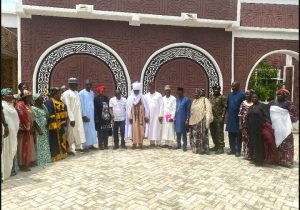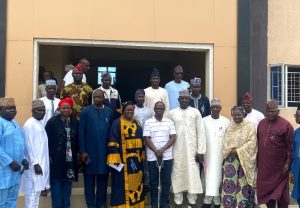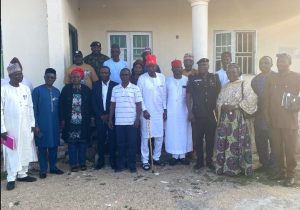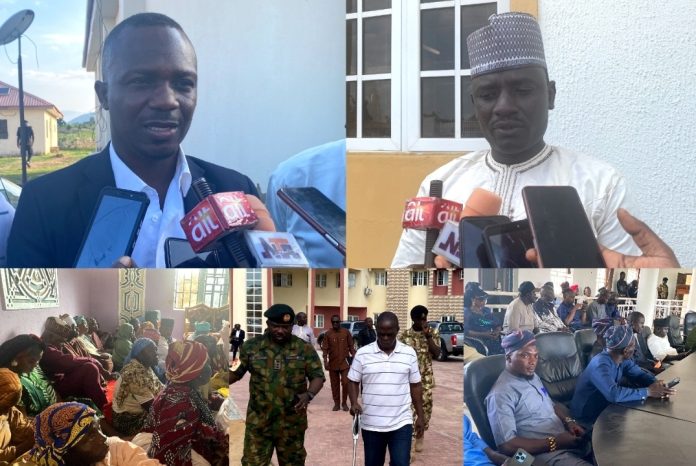Local Stakeholders Task Plateau Committee on Community-Led Peace Solutions in Kanam, Kanke
As the Plateau State High-Powered Fact-Finding Committee continued its assessment tour on Monday, July 28, 2025, stakeholders in Kanam and Kanke Local Government Areas emphasized the importance of locally-driven solutions, urging the committee to prioritize community input and traditional structures in its final recommendations.

 In Kanam, where the committee was received by the Deputy Chairman Hon. Aliyu S. Ali and other officials, leaders expressed that enduring peace can only be achieved through inclusivity and grassroots engagement. Hon. Aliyu noted that while Kanam had experienced violent attacks in the past, its relative stability today was due to collective community vigilance, religious tolerance, and strong leadership at both local and traditional levels.
In Kanam, where the committee was received by the Deputy Chairman Hon. Aliyu S. Ali and other officials, leaders expressed that enduring peace can only be achieved through inclusivity and grassroots engagement. Hon. Aliyu noted that while Kanam had experienced violent attacks in the past, its relative stability today was due to collective community vigilance, religious tolerance, and strong leadership at both local and traditional levels.
“This visit is crucial,” Hon. Aliyu said. “Our people believe in dialogue and peace, and our traditional leaders have played a central role in preserving harmony. We call on the committee to reflect these local strengths in their recommendations.”
The committee, led by Maj. Gen. Nicholas Rogers (rtd), assured that their task was not only to identify the causes of violence but also to highlight what is working in each community.
“Kanam presents an opportunity to learn from a community that has experienced crisis and still managed to sustain internal peace,” Maj. Gen. Rogers noted. “We want to hear the voices of the people and understand how traditional and local systems contribute to security.”
The Emir of Kanam, HRH Alh. Muhammadu Mu’azu Muhammadu II, hosted the committee at his palace, where a closed-door session was held with district heads, youth leaders, and members of the traditional council. The Emir emphasized that traditional institutions must remain central to any peacebuilding initiative, citing the community’s historical roots and the unique role kingmakers and elders play in resolving conflicts.
“Our palace is a hub of dialogue,” the Emir said. “We bring people of different faiths and backgrounds together to foster mutual respect. Our responsibility is not political—it is moral and cultural. That’s why peace in Kanam is not by accident but by design.”

In Kanke LGA, where the committee met with Chairman Hon. Lapching Ezet Golime and his team, discussions focused on youth inclusion, land disputes, and intergenerational trauma stemming from past conflicts.
Hon. Lapching recalled personal encounters with violence during earlier crises and stressed the importance of empowering young leaders to shape a more secure future.
“Our generation is rising, and we carry the memory of past conflicts,” he said. “That’s why this engagement matters. We’ve shared our concerns with the committee, especially the need for structured resolution of land and chieftaincy disputes before they escalate.”
The committee chairman commended the youthful and proactive leadership in Kanke, noting that while the LGA faced minor challenges like kidnapping and transit insecurity, it had not experienced the scale of violence seen elsewhere.
“This kind of leadership gives us hope,” Maj. Gen. Rogers stated. “What we see in Kanke is a model of early response and youth-led governance that can be scaled.”
At the end of both visits, the committee reaffirmed its commitment to incorporating local voices, challenges, and existing community efforts into its final report to Governor Caleb Mutfwang. According to the chairman, the success of any state-led intervention depends largely on how well it aligns with grassroots realities.
“As we move from one LGA to another, one thing is clear: communities want peace, and they have ideas about how to achieve it,” he said. “Our job is to listen, document, and propose realistic solutions that empower the people.”
The tour continues as the committee engages remaining LGAs in its mission to restore Plateau State’s long-standing identity as the Home of Peace and Tourism.


